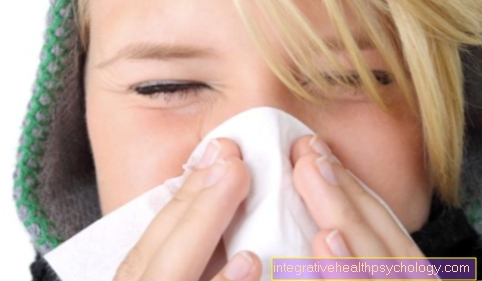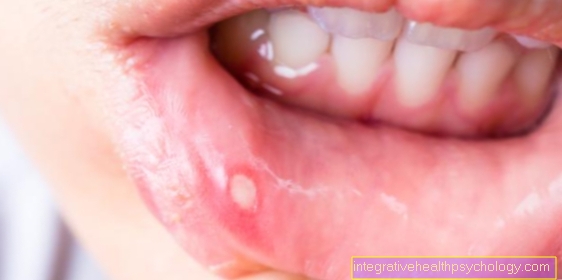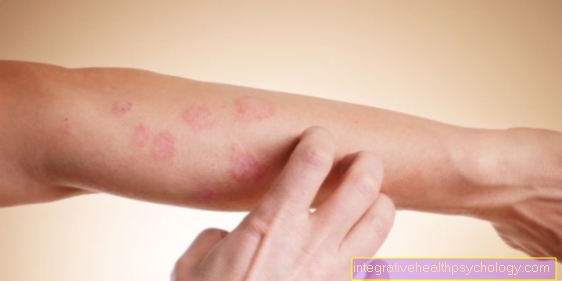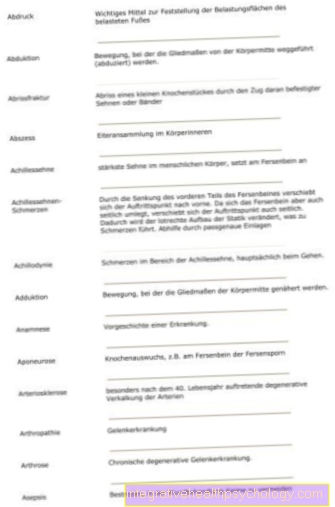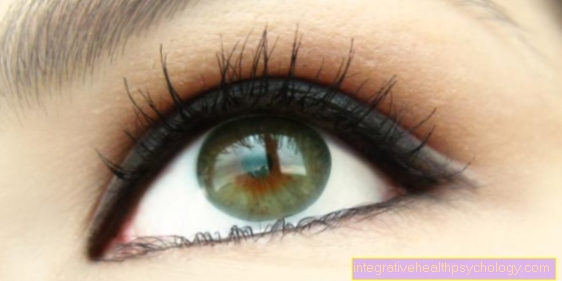Home remedies for herpes
introduction
Herpes is a common and very hated infection. The virus, which lies dormant in the body for a lifetime after an infection, can reactivate itself again and again and lead to symptomatic outbreaks in those affected. The sometimes painful blisters not only look unattractive, they are also infectious and so the risk of infecting others increases. Therefore, the demand for home remedies for herpes is understandably very high. But are there any home remedies for herpes and if so, how effective are they?
The following article deals with interesting questions and information on the subject of "home remedies for herpes".
You might also be interested in: Cold sores - this is how it is properly treated

Which home remedies can you use?
The subject of "home remedies for herpes" is a very controversial one. While home remedies for other diseases are sometimes recommended from a medical point of view or at least not advised against, it is somewhat different with herpes. Home remedies for herpes are predominantly strongly discouraged, as experts believe that the negative consequences outweigh the supposedly positive effects. Above all, it is criticized that treatment with home remedies delays treatment with antiviral drugs. This often extends the course of the disease.
Another point of criticism is that many home remedies - even the supposedly gentle ones - can cause irritation. But which home remedies can you use now? This question is not that easy to answer. If you don't want to do without home remedies, you should at least resort to the most gentle ones. These are mainly honey, black tea, zinc paste, lemon balm, garlic and ginger. Tea tree oil, toothpaste, alcohol, baking powder or other recommendations should be avoided.
Furthermore, the home remedies mentioned are only suitable for a cold sore and not for the treatment of other types of herpes. In addition, you should only apply them with a cotton swab or gloves, otherwise viruses will be carried with your hands and the herpes will spread. The home remedies should be applied before the cold sore breaks out. However, it is best to consult a doctor or pharmacist beforehand to make sure that the home remedy does not harm you.
Also read:
- Treatment of cold sores
garlic
Garlic is often thought to have antimicrobial properties. However, there is no scientific evidence that garlic is effective against herpes. Nevertheless, many sufferers are convinced of garlic as a home remedy for cold sores. To do this, cut a clove of garlic into slices and rub the affected area with it for a few seconds.
Many sufferers report less itching and less discomfort in general with this home remedy. However, it is very important to only use the garlic before cold sores have formed. As soon as there are cold sores, they should no longer be manipulated, otherwise they can burst. In this case, the risk of infection for other people would be greatly increased.
ginger
Similar to garlic, ginger root is also said to have a disinfecting and antimicrobial effect. But as with garlic, there is no scientific evidence of the effectiveness of ginger in herpes. Some sufferers find ginger beneficial for a cold sore. The ginger is cut into thin slices and pressed onto the affected area and rubbed. As soon as it dries out, it is discarded and replaced with a new disc. However, the ginger should only be used before cold sores have formed. Otherwise, you provoke the vesicles to burst and the virus to spread further. Even with this supposedly beneficial home remedy, one should note that it can cause skin irritation and apart from that it is not effective against the virus itself. Ginger is also not suitable for use in genital, eye or nasal herpes.
chamomile
Chamomile is not a classic home remedy for herpes. In fact, chamomile can cause irritation and even allergic reactions, especially on the nose, genital area or eyes. It is therefore not advisable to use chamomile extracts, wrung out tea bags or inhalations against the symptoms of active herpes. In the worst case, there is a risk of further irritation or rashes from the chamomile.
toothpaste
Although toothpaste is often touted as a popular home remedy for herpes, this home remedy should be avoided. Toothpaste contains a lot of ingredients that can irritate the skin. Since the skin is irritated by the herpes anyway, you should avoid further irritation. In fact, toothpaste is only effective in some cases because it contains zinc. The disinfecting and drying effect of zinc can be achieved much better by using a zinc paste. Toothpaste should therefore not be used as a home remedy for herpes.
Read on in our main article: Toothpaste for herpes
zinc
Zinc paste is often used to treat herpes. Zinc has a disinfecting and drying effect, so that many people affected find the ointment very pleasant. However, zinc ointment does not have a direct antiviral effect.
Nevertheless, from the point of view of many people affected, it has a positive effect on the oozing cold sore. The best thing to do is to ask a pharmacy for a suitable paste that can be applied thinly to the cold sore. You should always use a cotton swab to apply it and not touch the blisters directly to prevent the virus from spreading further. However, many dermatologists also advise against the use of zinc paste, as it is too drying.
Black tea
Black tea is a popular and simple home remedy for preventing cold sores. However, it should only be used before vesicles appear. Those affected usually feel symptoms in advance and therefore know when an outbreak is threatened again. The tea bag should first be boiled in water and then wrung out. When the teabag has cooled down a bit, it can be pressed onto the affected area for a few minutes. However, this home remedy is not suitable for treating nasal, eye or genital herpes.
Tea tree oil
Tea tree oil is very often mentioned as a home remedy in connection with herpes. But what exactly is tea tree oil used for and how effective is it really? Tea tree oil is an essential oil that is often recommended as a home remedy for many diseases.
It is said to have an antimicrobial effect. Many sufferers, especially when a herpes outbreak is beginning, drip some tea tree oil on the affected area to prevent symptoms.
However, one should keep in mind that tea tree oil is considered a risk substance for contact dermatitis, so it can cause a rash. Tea tree oil is not suitable for use in the genital area, eyes or nose. It should also not be applied undiluted.
Before tea tree oil is used as a home remedy for herpes, you should consult a doctor or pharmacist.
Read more on the topic: Tea tree oil
baking powder
Some people find baking soda to be very beneficial for a cold sore. You can use a cotton ball to apply a little of the baking powder to the cold sore. Above all, the itching and tingling sensation in the blisters is somewhat relieved. The process can be repeated several times a day with a fresh cotton ball. Of course, baking soda is not effective against the viruses. Nor can it prevent other people from being infected through the vesicles.
Home remedies for cold sores
The demand for home remedies for cold sores is very high. Therefore, the question often arises which home remedy is actually suitable for treating cold sores. Although many sufferers like to use home remedies frequently, the general opinion of experts - especially dermatologists - on this subject is rather negative.
Most home remedies are not only ineffective, but can also have negative effects on the patient. The consequences can be prolonged disease, skin irritation, allergic reactions or even the spread of the virus.
Therefore, one should generally be critical of home remedies for herpes. In the case of a cold sore, there are some home remedies that are definitely not to be used.
These include toothpaste, alcohol, and chamomile tea. Home remedies, such as zinc ointment and Mellissa tincture, at best have a soothing effect. Garlic, ginger or black tea also seem to be somewhat soothing for the itching and irritation of the skin, but these home remedies are not effective against the virus itself.
Another common home remedy is tea tree oil. However, this can lead to skin irritation and allergic reactions.
The following rule also applies to all home remedies: They should only be used before a cold sore outbreak and never afterwards! Otherwise the vesicles could burst and the virus could spread. Finally, there is another popular home remedy that can be used for a cold sore, namely Manuka honey. This special honey contains a metabolic product called methylglyoxal, which has an antibacterial effect. However, the honey does not seem to be effective against viruses. Nevertheless, many sufferers like to use the honey as a home remedy and apply it thinly to the affected area with a cotton swab. It is best to apply the honey before the cold sore breaks out. The application can be repeated every 2 hours. However, the effectiveness cannot be proven with certainty in studies, although this is often claimed on various websites.
Read more on the topic: Cold sore creams
Home remedies for genital herpes
Genital herpes, like cold sores, is a recurrent disease. This means that after asymptomatic phases, outbreaks of disease with painful cold sores can occur again and again. Especially in stressful phases of life, with the flu or cold or after increased exposure to the sun, the disease breaks out again frequently. In the case of genital herpes, however, home remedies should be avoided. The genital area and the genital mucous membranes are very sensitive and therefore prone to irritation from home remedies. Although recommendations for home remedies such as tea tree oil, ginger, garlic or lemon balm are often found, we can only advise against them at this point. The risk of irritation and thus a delay in the course of the disease is simply too great.
You might also be interested in: Genital herpes
Home remedies for ocular herpes
The eyes are very sensitive and therefore you should definitely refrain from using home remedies for an ocular herpes. Irritation and slight allergic reactions are the most harmless side effects that home remedies can bring with them. In the worst case, you endanger your visual performance. Therefore, herpes on the eyes should only be treated by a doctor.
Home remedies for herpes on the nose
We also advise against using home remedies on the nose. The close proximity to sensitive eyes in particular makes potential irritation from home remedies very dangerous. Manipulating the nasal herpes can also spread the herpes to the eyes and should therefore be avoided.
In particular, essential oils, hot substances such as ginger and garlic, toothpaste, tea tree oil and the like are not suitable for being applied inside the nose. In this case, irritation is very likely and can even impede nasal breathing.
You might also be interested in: Herpes on the nose
Further informationYou can find more information about cold sores here:
- Herpes symptoms
- Herpes Simplex Virus
- Herpes zoster
- Cold sore
- Herpes simplex
- Genital herpes
- Herpes in the mouth
- Herpes nose
- Cold sore creams
- Duration of cold sores



